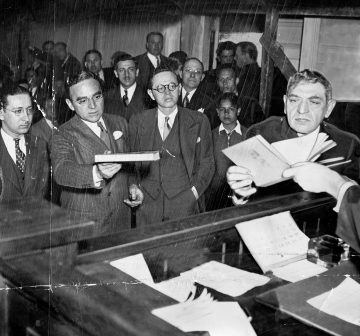Michael Chabon in the New York Review of Books:

It was a setup: a stratagem worthy of wily Ulysses himself.
The conspirators were Bennett Cerf, publisher and cofounder of Random House, and Morris Ernst, general counsel of the ACLU. The target was United States anti-obscenity law. The bait was a single copy of an English-language novel, printed in Dijon by Frenchmen who could not understand a word of it, bound in bright blue boards, and sold mail-order by the celebrated Paris bookshop Shakespeare and Company. When Cerf and Ernst first began to conspire in 1931, the novel, James Joyce’s Ulysses, was the most notorious book in the world.
“It is,” the editor of the London Sunday Express had written nine years earlier, sounding like H.P. Lovecraft describing Necronomicon:
the most infamously obscene book in ancient or modern literature….All the secret sewers of vice are canalized in its flood of unimaginable thoughts, images and pornographic words. And its unclean lunacies are larded with appalling and revolting blasphemies directed against the Christian religion and against the name of Christ—blasphemies hitherto associated with the most degraded orgies of Satanism and the Black Mass.
Regarded as a masterpiece by contemporary writers such as T.S. Eliot and Ernest Hemingway, celebrated for being as difficult to read as to obtain, Ulysses had been shocking the sensibilities of critics, censors, and readers from the moment it began to see print between 1918 and 1920, when four chapters were abortively serialized in the pages of a New York quarterly called The Little Review.
More here.
